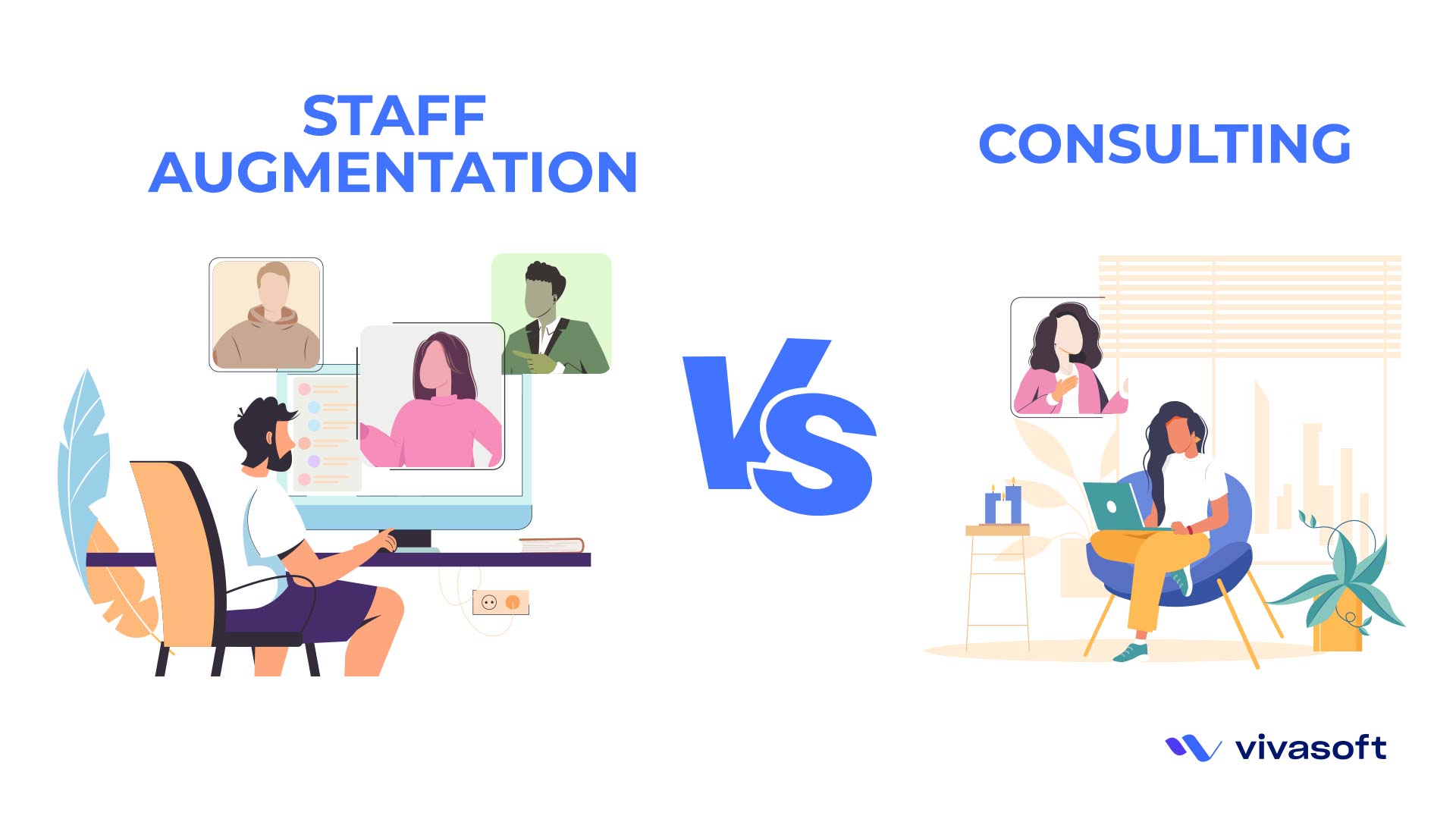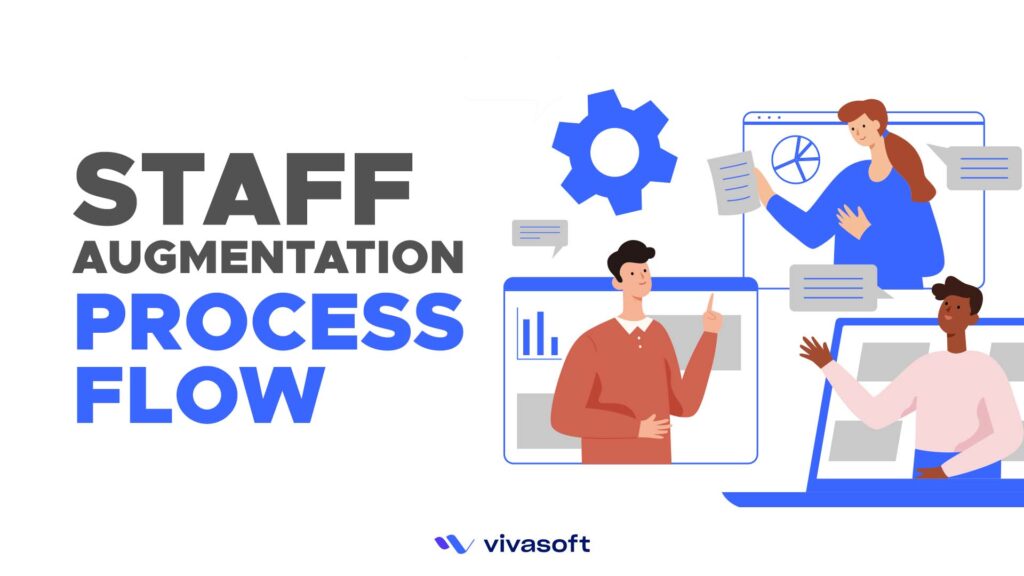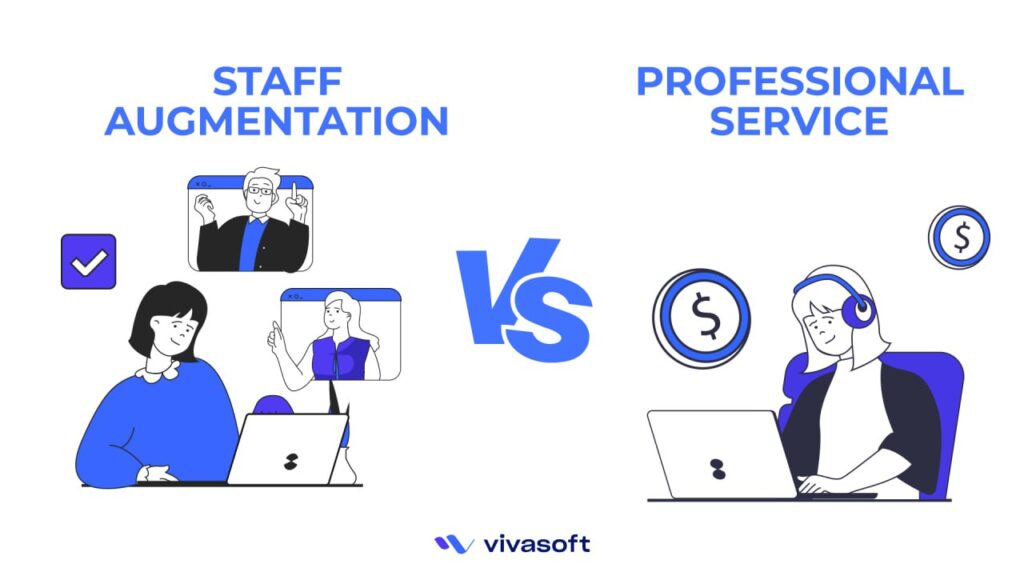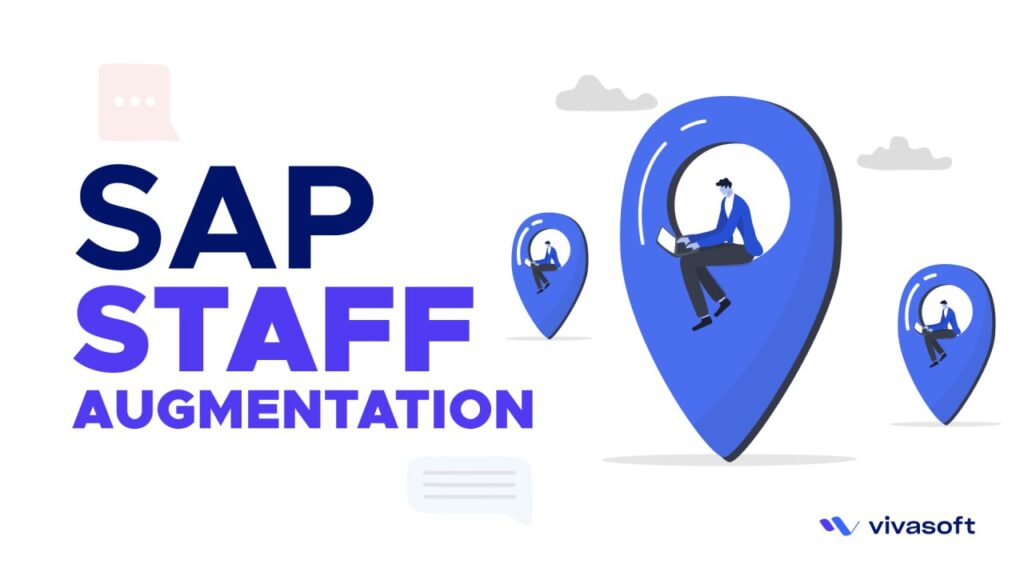Are you looking for a complete guide to understanding the differences between staff augmentation vs consulting? Before we begin to understand which method is better for us, we need to understand what staff augmentation and consulting entail.
Staff augmentation refers to hiring external individuals for a project temporarily. This either happens due to staff shortage, or a need for more expertise within the in-house team. Consulting refers to hiring a company that provides expertise in a particular field; such as business strategy and performance management.
In this article, we are going to cover the basics of both and analyze the key differences. Stay tuned till the end to see which one we recommend for tech startups!
Definition of Staff Augmentation
Sometimes organizations need help in completing projects that are beyond the scope of their in-house team. You may have a project deadline that will be impossible to meet with the current number of people in your team. Or, the project may require skills that your current team doesn’t have. This is where staff augmentation comes in as a solution.
This is a type of outsourcing model (although it is very different from staff outsourcing), where a company hires temporary workers to add to their in-house team for the duration of the project.
There are many types of staff augmentation: traditional, onshore, offshore, remote, agile, etc. Whether you need workers from your own country or abroad, whether you require team members to work onsite or online, there exists a staff augmentation model for all your needs.
You can learn more about the types of staff augmentation here.
Definition of Consulting
Consulting (often referred to as project consulting) alludes to the process of hiring outside help for your project. Although at first glance this sounds similar, consulting and augmentation are vastly different.
In consulting, the workers, usually experts in their respective fields, don’t act as a part of your team, and they aren’t your full-time employees. This renders the company less overall control of the team.
The consultants are experts who work from the outside, providing advice and consultation to your in-house team. Although the teams work simultaneously on the same project, during consulting, you are working with the consulting company, you are not having workers added to your overall team.
Key Differences Between Staff Augmentation and Consulting

Here is the full analysis of how we view staff augmentation vs consulting. We’ve dissected the main key differences below:
The Type of Project
Although this isn’t a hard-and-fast rule, staff augmentation can usually take place during any stage of the project completion. This is because staff augmentation doesn’t require companies to hire an entire team.
However, since consulting means that the company is going to be hiring an entire team of experts, this is usually done at the beginning of the project. This is beneficial because the project can be independently left off to the consulting team.
The Type of Team
What kind of people are hired during each outsourcing strategy? Staff augmentation and consulting both involve hiring experts. However, staff augmentation involves hiring individual workers to be part of your current in-house team, to work with you on the project. However, consulting doesn’t work that way.
Consulting involves hiring a company, which then sends a team over to work on your project. The team is not going to be part of your in-house team and is going to work externally on the project. In staff augmentation, the people become your full-time employees. That doesn’t happen in the case of consulting.
Control
Because of the nature of the teams being hired, you have greater control over the team in staff augmentation. This is because, for the duration of the project, the augmented team is completely your company’s team. Whereas, the consultation team is still working independently.
Flexibility
Staff augmentation is usually more flexible compared to consulting. This is because you can hire people as needed on a contractual basis. Once the project is over, or your requirements for an augmented team are over, you don’t have to keep working with them anymore!
Security
Staff augmentation is usually more secure. This is because the data stays within the company, and there are fewer chances of security breaches occurring since the data never leaves your company and your team.
Our Verdict Between Staff Augmentation and Consulting

There are harms and benefits to all business practices, and it’s hard to find a strategy that doesn’t have cons. However, in this case, we think there is a superior strategy between the two. Let’s break down our analysis into two parts, by explaining some advantages of both consulting and staff augmentation.
Consulting
First, let’s look at the pros of consulting. Consulting offers you the luxury of working with experts in their respective fields, which means they can deliver efficient, productive, and cost-effective results. This makes project completion quite easy because you can rely on the professionals to help accelerate your project completion, and still have a product that will satisfy your customers.
This sounds amazing- because it is. However, there’s one important thing to note. Staff augmentation can offer these same benefits, and many more, while also not having some of the harms associated with consulting. Let’s break down the benefits of staff augmentation, and how it offers similar ones to consulting.
Staff Augmentation
Staff augmentation also allows you to work with experts. The individuals you will be hiring to work within your team during the project completion timeline are all going to be experts in their field. Which means this benefit is co-opted.
Additionally, staff augmentation also allows the workforce to be more efficient, productive, and cost-effective. Since the workers are all experts, there are no costs associated with traditional hiring practices, or training programs, since the workers will all be trained.
Staff augmentation also allows you to be flexible in your approach, you can hire remote staff as well, and you can hire talent from all across the globe through offshore or nearshore staff augmentation, and you can have your team members work online instead of onsite. Not to mention, there are reduced overhead costs for this as well, making it more cost-effective.
The benefit of staff augmentation above consulting is the lack of control you have over the team when you work with consultants. Since the project is being worked on by an external company, they won’t function as a unit with your team. This means there is a greater lack of control, while in staff augmentation, you work as a unit to complete the project together because the workers become your full-time employees.
Our verdict is as follows: We think staff augmentation is a better option for tech companies and startups. Not only does it provide the same benefits as consulting, it also has fewer harms, and allows you to retain greater control over your team.
Here’s a small summary table of the key differences discussed above:
| Feature | Staff Augmentation | Consulting |
|---|---|---|
| Project | Can take place at any point in the project | Has to take place at the beginning |
| Team | Augmented members made full-time employees | Team works externally |
| Control | More flexible, the number of people hired depends on the changing nature of the project | Less flexible, the whole team has to be hired for the entire duration of the project |
| Security | More secure, company data retained within the company | Less secure, company data has to be given to an external vendor for project completion |
Benefits of Staff Augmentation
Staff Augmentation is a fantastic solution for tech companies and startups who are handling projects that may seem daunting at first. With the correct augmented staff to your in-house team, there will be countless project management and IT solutions for your problems. There are many benefits of staff augmentation, some of which are described below.
| Top Five Benefits of Staff Augmentation |
|---|
| 1. Greater Efficiency and Reduced Costs |
| 2. Greater Competitive Advantage |
| 3.Greater Scalability and Flexibility |
| 4. Greater Access |
| 5. Greater Customer Satisfaction |
Greater Efficiency and Reduced Costs:
Companies spend a large amount of time and money on training their employees and making sure the employees are well-versed in up-to-date technologies and processes. When you opt for staff augmentation, the workers are already experts in their respective fields and already possess up-to-date knowledge. This results in their work being more efficient.
Additionally, companies invest a lot in training programs for employees. However, those overhead costs are reduced because the new augmented team members won’t require any training. Furthermore, there aren’t any time-consuming traditional hiring practices involved with staff augmentation.
s who are handling projects that may seem daunting at first. With the correct augmented staff to your in-house team, there will be countless project management and IT solutions for your problems. There are many benefits of staff augmentation, some of which are described below.
Greater Competitive Advantage:
If you’re a startup investing in staff augmentation, that gives you a leg up over your competitors. Many companies don’t have the opportunity to work with experts on their projects. This will set your company apart; you can leverage the best technologies and work practices to complete your projects, while your competitors can’t.
This gives your business a headstart because you can complete projects faster, more efficiently, and have more productive employees while simultaneously cutting down on costs.
Greater Scalability and Flexibility:
Demands in the IT market are always fluctuating and companies need to keep up with these changing trends and practices. Additionally, having an augmented team is beneficial to keep up with large projects with changing requirements over time. This allows the company to scale up or down as needed.
For instance, if the company needs an entirely new team to accelerate the completion of a project, it can hire a new software development team on demand for the duration of the project. Not to mention, if they need fewer resources, they can manage those accordingly.
Greater Access:
Staff augmentation provides unlimited access to resources. You don’t have to have experts from within your national borders if you opt for nearshore or offshore staff augmentation. You can hire experts in different countries, continents, and time zones. Additionally, if you opt for remote staff augmentation, your hired experts will work online.
This means the entire global talent pool of experts is at your disposal.
Greater Customer Satisfaction:
IT staff augmentation allows for more efficient business strategies. This also leads to more productivity in the workforce and accelerated project completion.
Staff augmentation has also been cited to improve project management, leading to overall better results. Consequently, better products and services are born out of an augmented team, which leads to more customer satisfaction.
This leads to a chain reaction of customers recommending the products and services to others, leading to exponential growth of exposure and revenue.
Conclusion
Although staff augmentation and consulting sound similar, there are some key differences between them. Staff augmentation refers to experts being hired to work within your team, consulting refers to hiring a company that externally works on the project.
There are harms and benefits to both of these business practices. However, staff augmentation has more benefits than consulting, and is usually a better fit for tech companies and startups. We hope this article helped you to understand the concepts of staff augmentation vs consulting better!
FAQ's
No, they are not. Staff augmentation refers to hiring experts to work as part of your team for the duration of the project. Consulting refers to hiring a company that works externally on the project.
Staff augmentation is considered to be a model of outsourcing, but it’s very different from outsourcing: outsourcing means the project is being given to an external third party with the company having very limited control over the project.
Hiring software developers in a team that lacks experienced software developers to complete a software development project.
Staff augmentation leads to better efficiency, productivity, scalability, flexibility, with reduced costs.
















